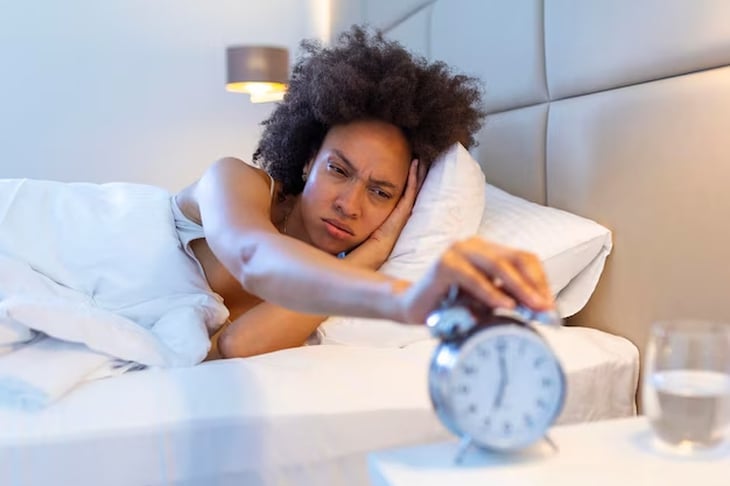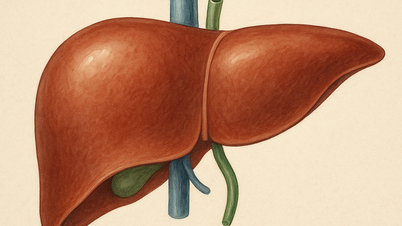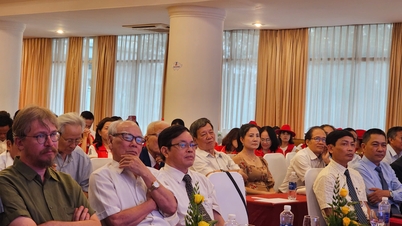
People who stay up late are at high risk of depression - Photo: FREEPIK
According to Science Alert, this study has determined chronotype (biological time, or the term used to classify differences in the natural sleep-wake rhythm of humans), showing that people who often stay up late have a high risk of depression.
Staying up late is more likely to cause depression
“Chronotype, also known as ‘eveningness’ or ‘night owl’, is a biological tendency to prefer evening activities and to go to bed and wake up late,” neuroscientist Simon Evans told BBC Science Focus. “Chronotype has a genetic basis, so being a ‘night owl’ is a natural biological tendency.”
Of the study participants, only 38 were “early birds.” There were 252 people with an evening chronotype, while the remaining 256 had an intermediate sleep-wake cycle.
Since the average age of the participants was around 20, this distribution is not surprising. People in their late teens tend to have an evening chronotype, while morning chronotypes tend to be more common in old age.
Study subjects also answered questions about sleep quality, tendency to repetitive negative thinking, depression, level of mindfulness, and frequency of alcohol use.
Previous research has shown that a late chronotype is associated with a higher risk of severe depressive symptoms, and this study confirms that. People with an eveningness profile had significantly higher depressive symptoms than those with an intermediate chronotype.
How to limit the risk?
One possibility is that depression may promote a late chronotype, making it difficult for sufferers to find the motivation to get out of bed in the morning, and difficult to relax and fall asleep at night due to constant negative thoughts.
The study also found that the night owl group had significantly higher levels of repetitive negative thinking.
Further statistical analysis suggests that there are still ways to mitigate the association between late chronotype and depression risk.
Mindfulness-related traits, especially “acting with awareness” (the ability to not judge emotions and thoughts, whether positive or negative) and “verbalizing” (the ability to name emotions and thoughts), had significant effects.
“Acting with awareness” is a prominent trait of early risers. It may be the secret to their positive mental state. But it is also closely related to sleep quality, because better sleep reduces fatigue and increases the ability to concentrate.
Alcohol consumption was also a notable mediator. Night owls tended to drink more alcohol.
“Our research suggests that strategies to improve mindfulness, such as meditation and mindfulness exercises, would be helpful, as would improving sleep quality and reducing alcohol consumption,” Evans told the BBC.
The study was published in the scientific journal PLOS One .
Source: https://tuoitre.vn/neu-hay-thuc-khuya-ban-co-nguy-co-mac-can-benh-nay-cao-hon-20250329134450032.htm



![[Photo] President Luong Cuong presents the decision to appoint Deputy Head of the Office of the President](https://vphoto.vietnam.vn/thumb/1200x675/vietnam/resource/IMAGE/2025/5/8/501f8ee192f3476ab9f7579c57b423ad)

![[Photo] National Assembly Chairman Tran Thanh Man chairs the meeting of the Subcommittee on Documents of the First National Assembly Party Congress](https://vphoto.vietnam.vn/thumb/1200x675/vietnam/resource/IMAGE/2025/5/8/72b19a73d94a4affab411fd8c87f4f8d)
![[Photo] Prime Minister Pham Minh Chinh meets with the Policy Advisory Council on Private Economic Development](https://vphoto.vietnam.vn/thumb/1200x675/vietnam/resource/IMAGE/2025/5/8/387da60b85cc489ab2aed8442fc3b14a)
![[Photo] General Secretary concludes visit to Azerbaijan, departs for visit to Russian Federation](https://vphoto.vietnam.vn/thumb/1200x675/vietnam/resource/IMAGE/2025/5/8/7a135ad280314b66917ad278ce0e26fa)
















































![[Photo] Prime Minister Pham Minh Chinh talks on the phone with Singaporean Prime Minister Lawrence Wong](https://vphoto.vietnam.vn/thumb/402x226/vietnam/resource/IMAGE/2025/5/8/e2eab082d9bc4fc4a360b28fa0ab94de)


































Comment (0)